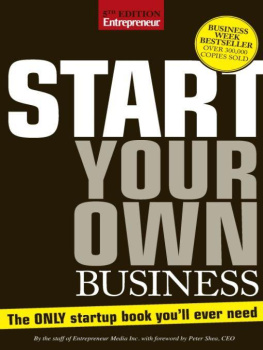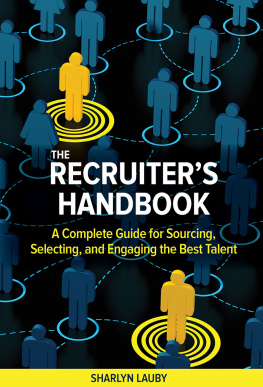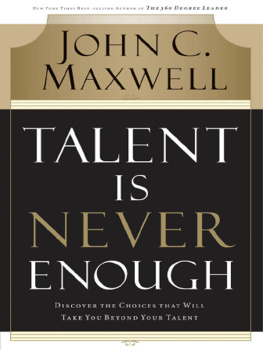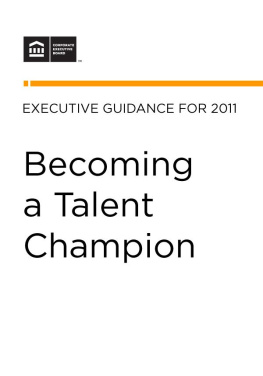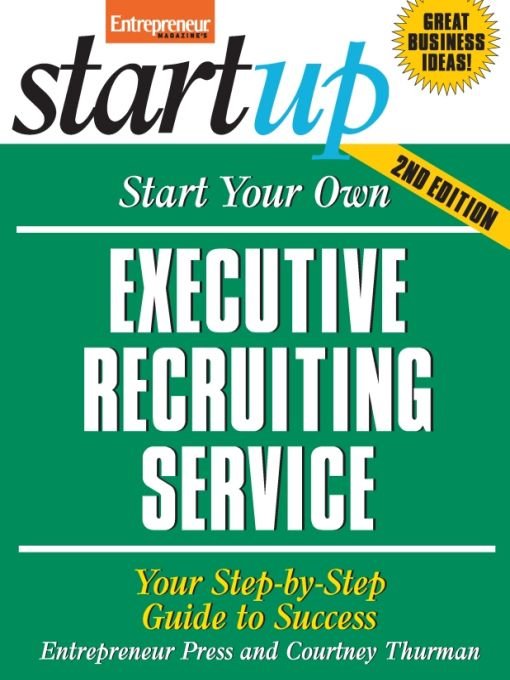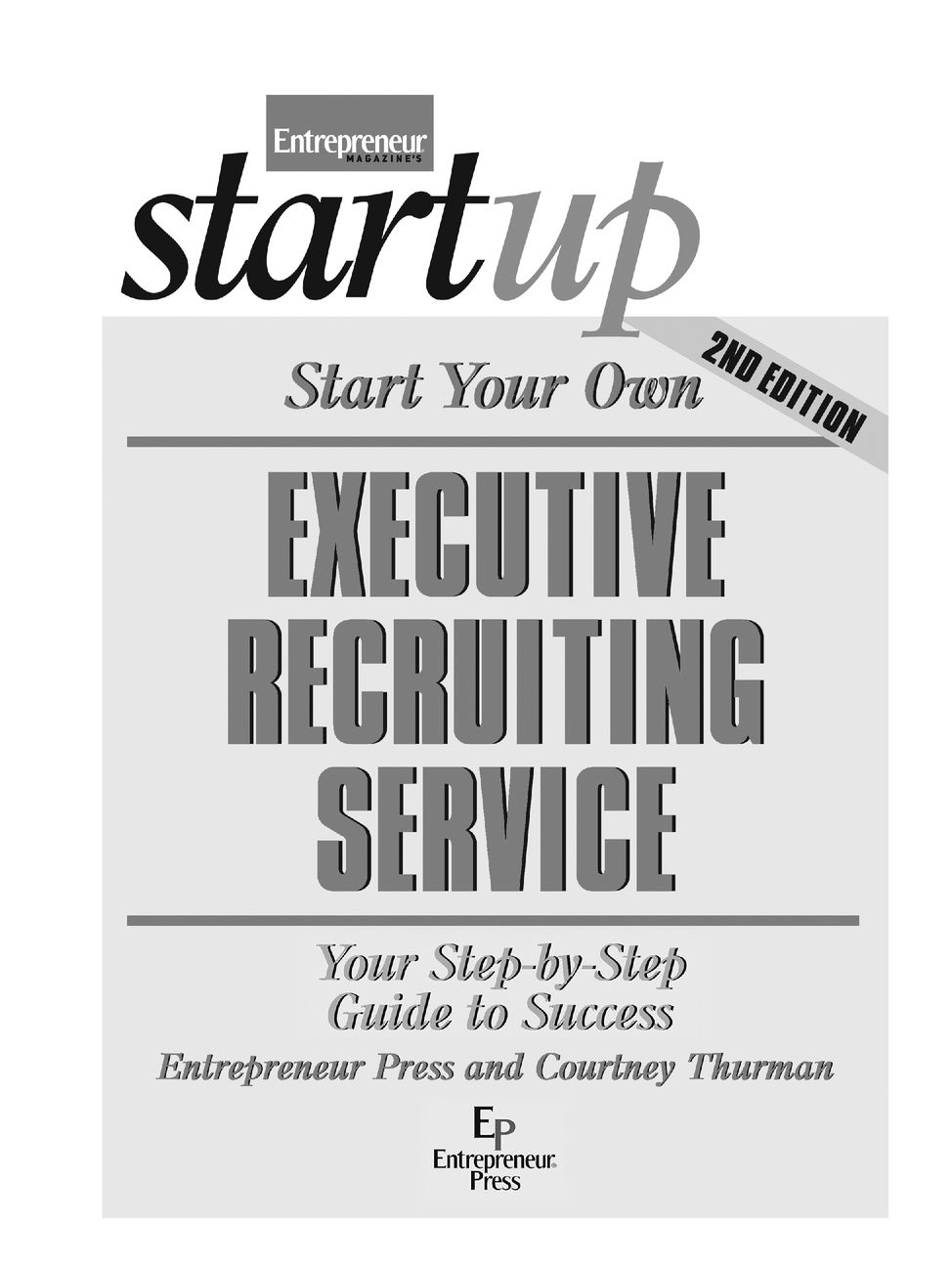Table of Contents
Additional titles in Entrepreneurs Startup Series
Start Your Own
Arts and Crafts Business
Bar and Club
Bed & Breakfast
Business on eBay
Business Support Service
Car Wash
Child Care Service
Cleaning Service
Clothing Store
Coin-Operated Laundry
Consulting
e-Business
e-Learning Business
Event Planning Business
Freight Brokerage Business
Gift Basket Service
Growing and Selling Herbs and Herbal Products
Home Inspection Service
Import/Export Business
Information Consultant Business
Law Practice
Lawn Care Business
Mail Order Business
Medical Claims Billing Service
Personal Concierge Service
Personal Training Business
Pet-Sitting Business
Restaurant and Five Other Food Businesses
Self-Publishing Business
Seminar Production Business
Specialty Travel & Tour Business
Staffing Service
Successful Retail Business
Vending Business
Wedding Consultant Business
Wholesale Distribution Business
Preface
Seventy phone calls a day. If your phone is already permanently fixed to your ear, this may be the industry for you.
Executive recruiters typically spend at least four solid hours on the phone; some people will be willing to talk to you, and many wont. But it takes just a few cases where the match is made that can get a recruiter addicted to what they do and absolutely love doing it.
Does it sound like that could be you? It takes a certain personality type to survive in the recruiting world: extroverted, tenacious, and thick-skinned. You must love yakking on the phone, never bat an eye at making cold calls, and welcome rejection as part of the job. You also need to be attentive to detail, patient, and good at negotiating a deal. The business is people-based so if you have the people skills, you have picked up the right book.
Maybe you are checking out this book after hearing about the growth in the industry and you want to get into it yourself for the first time. Or maybe youre currently working in the industry and you want to start a business with your own clients.
If this describes you, read on. Executive recruiting can be quite rewarding and lucrative, with salaries as high as six or even seven figures. Its also very competitive: Three-quarters of recruiting firms fail within the first few years.
Read this book carefully and be honest with yourself about your abilitiesthen youll be a good judge of whether starting a recruiting business will be a good investment of your time. And if you decide it is, this book will help you become one of the success stories. We will give you an overview of the business and provide resources in the Appendix to do your specialized research. It takes a lot of research to start up a business, but with this book, you will have a roadmap.
In the following pages youll learn about the experience and training you need before you can start your own business. Taking a job with a recruiting firm or purchasing a franchise that offers training is usually the best way to go.
When youre ready, this book will help you hang out a shingle, including choosing a specialty, finding clients, developing contacts, and building a reputation. Youll discover the different ways recruiters workon contingency or retained by a clientand find which approach may work best for you. Youll also learn what recruiters charge for their services, when they bill, and how to draw up a contract.
This book will walk you through the steps of recruiting candidates for a position, from gathering resumes, interviewing, and making background checks to presenting the top candidates to your client.
Youll learn how to weather a recession, how to maintain good relations with your clients, and how to keep up with the news in your specialty.
Because your business may grow enough that you may need help finding candidates for jobs, this book covers hiring, managing, and training employees. It also discusses when it helps to have recruiters working for you and when it makes more sense to go it alone.
Finally, youll learn how to evaluate your performance to find your weak areas and become a more effective, and better paid, recruiter.
As comprehensive as this book is, it cant tell you everything you need to know to start up a recruiting business. A lot depends on your connections, your chosen specialty, your location, and the state of the economy. There are so many facets to this business that you will need to do additional targeted research into your specialty. This book will help point you in the right direction. An appendix full of resourcesincluding consultants, associations, newsletters, and bookswill help you find answers to your questions.
Starting up a recruiting business is a big commitment of time and energy. You want to weigh your decisions as carefully as possible, consider all the options, and be aware of potential downfalls. This book will help you do just that.
Recruiting Realities
A good analogy when looking at this industry might be that when employees change jobs they become professionally single and are looking to get back into the employment dating scene. The search begins and so can the excitement of finding the perfect match. The arrangement needs to work for both parties.
Given how frequently employees change jobs, it should come as no surprise that executive recruiters, also commonly known as headhunters, are rapidly increasing in numbers. The more people change jobs, the more work there is for recruiters, and the more matches to be made. Unfortunately, this business is also terribly competitive for that reason.
In this chapter well give you an idea of what the executive recruiting business is all about. Well start with an overview of the industry, including how much money a recruiter can hope to make and what the competition is like. Well also look back at how this business got started and take a peek into the future.
Recruiting 101
In a nutshell, a recruiter is someone who is hired by a company to find people qualified to fill a job openingcandidates. Often, companies hire recruiters only after theyve tried to fill the positions themselves. Recruiters usually work on a project-byproject basis. The client company pays the recruiter a percentagebetween 20 and 35 percentof the annual salary of the candidate who accepts the position. While the recruiter finds and screens candidates for the job, the client company makes the final decision on which person to hire.
Recruiting is an unregulated business, so industry statistics are difficult to come by, but Paul Hawkinson, publisher of The Fordyce Letter, puts recruiting at a $10 billionand growingindustry. There are about 5,000 recruiting firms in the United States, he says. A few very large firms dominate the industry, but most are very small: The average-size recruiting company has between two and three people.


